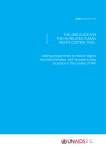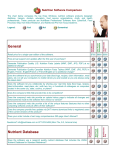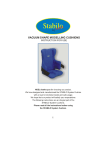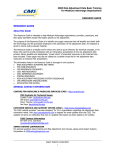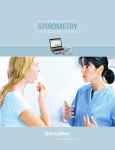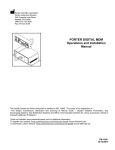Download Aging Well with HIV Manual Paragraph Page Part
Transcript
Aging Well with HIV Manual Paragraph Part One Introduction Chapter 1 Chapter 2 User guide_ _ _ _ _ _ _ _ _ _ _ _ _ _ _ _ _ _ 1-1 to 1-4 Chronic HIV and its effects_ _ _ _ _ _ _ _ _ 2-1 to 2-4 Part Two Common problems in people aging with HIV Chapter 3 Chapter 4 Chapter 5 Chapter 6 Chapter 7 Chapter 8 Chapter 9 Chapter 10 Chapter 11 Pain_ _ _ _ _ _ _ _ _ _ _ _ _ _ _ _ _ _ _ _ _ _3-1 to 3-8 Too many pills_ _ _ _ _ _ _ _ _ _ _ _ _ _ _ _ 4-1 to 4-7 Memory problem_ _ _ _ _ _ _ _ _ _ _ _ _ _ _5-1 to 5-6 Weakness/frailty_ _ _ _ _ _ _ _ __ _ _ _ _ _ 6-1 to 6-10 Weak bones_ _ _ _ _ _ _ _ __ _ _ _ _ _ _ _ _ 7-1 to 7-9 Heart disease_ _ _ _ _ _ _ _ __ _ _ _ _ _ _ _ 8-1 to 8-9 Lung disease_ _ _ _ _ _ _ _ __ _ _ _ _ _ _ _ 9-1 to 9-9 Kidney disease_ _ _ _ _ _ _ _ __ _ _ _ _ _ _ 10-1 to 10-6 Sexual health_ _ _ _ _ _ _ _ __ _ _ _ _ _ _ _ 11-1 to 11-9 Page 2-3 4 5-6 7-8 9-10 11-12 13-14 15-16 17-18 19-20 21-22 1 Part One Introduction Chapter 1 User guide 1-1. Purpose and scope a. Purpose: The Aging Well with HIV Manual is for people aging with chronic HIV. It describes common health problems that come with chronic HIV infection. Since many of these problems cannot be cured at present, the manual focuses on how to manage them, so that you can age well despite them. b. Scope: To keep the manual easy to read, we limit each chapter to 3 sections: 1. What is the problem? 2. Why is it important? 3. What should I do about it? The manual leaves out contents you do not need. For example, it does not include tests that will be ordered, or pills used to treat the disease. This is because your doctor will figure them out with you. 1-2. Outline of the manual Part one gives brief details about HIV and its general effects on aging. Part two outlines the most common problems with chronic HIV. Each chapter in part two is divided into 3 sections: a. The problem and its importance: This section explains what the problems are, and how these problems are different in people aging with HIV compared to others. Then, it explains why these problems are important to patients by describing their effects on daily life or functions. b. What to do with your doctor: This section alerts you to things you need to do with your doctor to solve the problems. You should read this section before going to the doctor, or show it to the doctor during your visit. 2 c. What to do on your own: This section focuses on things you need to do on your own to solve the problems. Your doctor can guide you through this section and answer questions you may have. But, you will have to take the steps yourself. 1-3. This patient manual is not: a. A guide to HIV as a disease in general: This patient manual does not aim to give advice on HIV in general. Instead, it focuses mostly on problems that occur in people aging with HIV and what to do about them. b. A replacement for doctors’ visits: The manual gives general advice on HIV and aging issues. But, it is not specific to each patient and will never be as good as your doctor’s advice. Always follow doctor’s advice, even if it is not the same as the advice in this manual. 1-4. Users’ comments or questions We welcome user comments and questions. Please comment or suggest changes based on specific page, paragraph, and line of the text. Please also include reasons for the change so that its purpose is clear. Please send comments or questions to [email protected]. 3 Part One Introduction Chapter 2 Chronic HIV and its effects 2-1. What is HIV? HIV stands for Human Immunodeficiency Virus. It is a virus that spreads through body fluids and destroys the immune system. 2-2. What happens if HIV is not controlled? If HIV is not controlled, it badly damages the immune system. Your body will not be able to fight infections or cancers that it usually could manage if it were healthy. This state is called AIDS, which stands for Acquired Immunodeficiency Syndrome. Without treatment, AIDS leads to death. When HIV first occurred in 1980s, we did not have good treatment. HIV was a death sentence. Now that we have good treatment, HIV is no longer a death sentence. 2-3. What happens now that we have good HIV treatment? With good treatment, HIV is now a chronic disease that people simply live with, like high blood pressure. The result is that for the first time, we now have people with chronic HIV, someone who have lived with HIV for decades. This has never happened before in human history, and we are leaning about what this means for the first time. 2-4. What happens with chronic HIV? We need more studies, but it seems that chronic HIV has bad health outcomes. This stems from 2 reasons: a. Virus damage: HIV can directly damage many organs, causing diseases. b. Side effects of HIV pills: HIV pills continue to get better everyday, with fewer side effects. But, many HIV pills we used in the past were quite toxic. Many people aging with chronic HIV took these pills when they were younger. These pills cause long-term damages that are still present today. 4 Part Two Common problems in people aging with HIV Chapter 3 Pain Section I. Pain and its importance 3-1. Why might people aging with HIV have pain problems? Other than the usual causes, people with HIV have HIV-related factors for pain, tingling and numbness. The virus can induce damage to nerves causing these symptoms. Some older HIV pills can also cause nerve damage. Luckily, they are not used often anymore. 3-2. What happens when you have problems with pain? Pain and numbness from nerve damage make you feel bad overall. It can cause depression or anxiety, and can disrupt your day-to-day life. Pain can disturb sleep and make you tired. This makes it hard to work or keep track of things. Sometimes tingling and numbness happen in the feet, causing people to fall and get injured. Section II. Pain: what to do with your doctor 3-3. Ask if any of your pills could be causing pain Ask your doctor if any of your pills can cause the side effect of pain, numbness or tingling. See if you can switch to another pill with fewer side effects. 3-4. Set pain goals with your doctor Pain does not usually get better overnight. As a result, treating pain needs time and patience. It is important to set realistic goals with your doctor, so that you are both on the same page. The goals should focus on 2 things: a. Pain relief: Set realistic goals about how much pain should decrease, by what time. For example, removing all pain by the next day is usually not realistic. A better goal might be to half the pain by next month. This depends on the kind of pain you have. Talk to your doctor about what is realistic. 5 b. Functional goals: Ask your doctor about how much function you can expect to regain with pain treatment. Example goals include sleeping without waking up from pain, returning to work, or climbing stairs without help. Tell your doctor about functional goals that are important to you, and work towards them. 3-5. Ask if there are options for your pain other than using pills Some non-pill treatments can work together with your pain pills to improve your symptoms. Sometimes, they can help you avoid side effects of pain pills by replacing them. Examples include heat, cold, massages, or exercises. Ask your doctor if these options might be right for you. Section III. Pain: what to do on your own 3-6. Take your pills correctly Take the right amount of pills at the right time of day. If this is difficult, use a pillbox or ask someone to remind you. This will help you: a. Get better pain control: It is easier to prevent pain than to get rid of it once it occurs. If you take pills at the right time to prevent pain, it will be easier to control. Sometimes, this means taking pain pills even when there is no pain. Work with your doctor on a pill schedule that meshes with your daily life. b. Avoid side effects: Too many pain pills can cause sleepiness, problem breathing, overdose and death. Never take more pain pills than what was ordered. 3-7. Get enough sleep Good sleep heals the body and can help reduce pain. It also puts you in a good mood, which helps you deal with pain better. If you have problem sleeping because of your pain, ask your doctor for help. 3-8. Avoid stress Stress makes you feel bad overall and can worsen pain. Try to avoid people or situations that make you stressed. If this is hard, talk to your doctor about exercises you can do to relax and reduce stress. 6 Part Two Common problems in people aging with HIV Chapter 4 Too many pills Section I. Too many pills and its importance 4-1. How many is too many? People tend to have more diseases as they age. As a result, many people aging with HIV take many pills. The correct number of pills for each person is different. This depends on the diseases they have. Sometimes, all the pills you take are needed. At other times, one pill can be too many if any of the following happens: a. It is not the right pill: Some people do not use the right pill for their disease. For example, some people use cold medicine to help them sleep, even if they do not have a cold. This is because cold medicine has a side effect of making people sleepy. This is wrong. Sleep aid should be used for problem sleeping, not cold medicine. b. It is not needed: Not every illness needs to be treated with pills. For example, back pain can get better with massages instead of pills. Also, some pills are not needed after a time. For example, antibiotics (pills that kill germs) are only needed for a few days. c. It stops other pills from working well: A pill can clash or interact with another pill you are taking. Sometimes, it can make the other pill weak and not active against the disease. Other times, it can make the other pill too strong, causing you to be sick from side effects. d. It makes you sick: Many pills have side effects that can make you sick. For example, many blood pressure pills can hurt your kidneys. 4-2. The importance of taking the correct number of pills Taking too many pills can cause 3 problems. First, it is hard to take a lot of pills correctly. Second, the more pills you take, the more side effects you may have. Third, the more pills you take, the more they are likely to clash with one another. 7 Section II. Too many pills: what to do with your doctor 4-3. Go over your pill list Go over your pill list every time you see your doctor. Bring all pill bottles to the doctor’s visit. This includes over-the-counter or herbal pills. Ask your doctor if any pill should be stopped or changed. This will keep you and your doctor on the same page about the correct pills you should be taking. 4-4. Talk to your doctor when your pill list changes Tell your doctor every time you start, stop, or change pills. This helps your doctor make sure your pills do not clash with one another. When starting a new pill, use the lowest amount possible. This way, if you have side effects, they will not be so strong. 4-5. If you get sick, ask if it might be from one of your pills If you get sick after starting a pill, ask if your illness can be a side effect of that pill. If a pill is making you sick, ask to see if you can take a different pill. This way, the illness can be stopped at its source, by stopping the pill that causes it. Section III. Too many pills: what to do on your own 4-6. Take pills correctly Take the right amount of pills at the right time of day. If this is difficult, use a pillbox or ask someone to remind you. This is really important for your HIV pills. If you do not take pills correctly, your HIV pills may stop working in the future. 4-7. Ask your pharmacy for help Your pharmacy can help you with many things. Most pharmacists can help answer questions you may have about your pills. Some pharmacies can help you take pills correctly by sorting them into plastic packages, called blister packs. All you have to do is open the packs and take the pills inside, no sorting needed. If you can, find a pharmacy that has worked with people with HIV. They have more experience making sure your pills do not clash and helping you take HIV pills on time. 8 Part Two Common problems in people aging with HIV Chapter 5 Memory problem Section I. Memory problem and its importance 5-1. Why do some people aging with HIV have memory problems? Age puts you at risk of memory problems from many causes. The most common cause in the US is Alzheimer’s disease. In Alzheimer’s, brain cells break down, causing lower brain function. People aging with HIV may have memory problems from Alzheimer’s, just like everybody else. But, HIV itself can also hurt brain cells. This makes brain problems more likely compared to people without HIV. 5-2. What happens when HIV hurts the brain? HIV can cause many problems, hurting your work, social and family life. a. Problems with brain function: HIV can cause memory problems, lower reading and math skills, lower attention, and problems dealing with information. b. Problems with mood: HIV can also cause anxiety and lack of interest. c. Problems with movement: HIV can also cause shaking of hands, making it hard to eat soup or to get dressed. It also causes poor leg movements leading to falls. Section II. Memory problem: what to do with your doctor 5-3. Talk to your doctor about HIV pills For many people, HIV pills can ease brain problems and stop them from getting worse. If you are not already taking HIV pills, ask your doctor if you can start. 5-4. Ask if you should also see other health care workers Other health care workers can give extra help with brain problems in HIV. If you have memory problems, ask if you should see a geriatrician. If you have mood problems, ask if you should see a psychiatrist. If you have problems with movement, ask if you should see a physical or occupational therapist. If you have problems with work or family life, ask if you should see a social worker. 9 Section III. Memory problem: what to do on your own 5-5. Take pills correctly Take the right amount of pills at the right time of day. If this is difficult, use a pillbox or ask someone to remind you. This is really important for your HIV pills. The lower your HIV, the less likely you will have brain problems. 5-6. Plan for the future Brain problems can cause trouble with health and money down the line. Plan ahead. Pick someone you trust to make decisions about money and health. This person is a backup in case you cannot make decisions on your own. Then, plan with that person. Tell them in advance how you want money and health handled. If you do not know how to plan for your health, ask your doctor for help. Write your plans clearly in a will, and give copies to your lawyer and family members. Keep your copy somewhere you can easily get to, in case you need it in an emergency. 10 Part Two Common problems in people aging with HIV Chapter 6 Weakness/frailty Section I. Frailty and its importance 6-1. What does frailty mean? Frailty, or weakness, means the body cannot fight off problems as well as it should. When there is an infection, frail people cannot fight it off very well. When they have accidents, their injury is worse compared to regular people. When they work, they get tired easily. They are slow and cannot do very much. 6-2. Why do aging people with HIV have weakness? People with HIV get weak sooner and more often than regular people. It might be because of what HIV does to the body, but no one knows for sure. 6-3. What happens when you are frail? Frail people are weak and cannot get around very well. This makes it hard to work or do things they enjoy. They are more likely to fall and get hurt. They are more likely to get sick and need to go to a hospital. When they have surgery, they often need more time to heal. They are also more likely to die. 6-4. How do I know if I am frail? There are many tests for frailty, but doctors cannot agree on the best one. So, different doctors may use different tests. In general, you might be frail if you are weak, slow, easily tired, or losing weight. Section II. Frailty: what to do with your doctor 6-5. Tell your doctor if you are losing weight Losing weight does not help frailty. If you have other causes for weight loss, they should be fixed. Ask if a nutritionist can help. 11 6-6. Tell your doctor if you are weak Your doctor may send you to physical therapists. They can show you how to exercise to get your strength back. They also stop accidents and falls by getting the tools you need to walk safely, like a cane or a walker. 6-7. Talk to your doctor before having surgery Frail people are more likely to have problems after procedures, like surgery. Ask your doctor if the procedure is worth the high risks that come with frailty. If you need the procedure, ask what can be done to avoid long hospital stay or other problems with frailty. Your doctor might send you to a nutritionist or a physical therapist to work on your weight and your strength before the procedure. Section III. Frailty: what to do on your own 6-8. Take pills correctly Take the right amount of pills at the right time of day. If this is difficult, use a pillbox or ask someone to remind you. Taking pills correctly helps keep diseases at bay. Without diseases, the body has a chance of getting stronger. 6-9. Eat a healthy diet The body needs food to stay strong. Food helps the body fight infection and gives it energy. If you are not sure how to eat a balanced diet, ask a nutritionist for help. 6-10. Exercise Exercise builds muscles, which will make you stronger and help you gain weight. It also helps with your energy, mood and sleep. Exercise often to keep strong. 12 Part Two Common problems in people aging with HIV Chapter 7 Weak bones Section I. Weak bones and its importance 7-1. What causes weak bones? Bone is a living organ. Throughout your life, the body tries to take away old bones and put in new ones. As you get older, the body gets worse at making new bones. This makes bones thin and weak. Also, other things can make your bones weak. Some you can control, like smoking or low vitamin D. Others you cannot control, like pill side effects or having HIV. 7-2. How does HIV make your bones weak? a. HIV messes up bone function: HIV makes the body take away bones faster than it should. It also slows down the building of new bones. b. HIV pills: Some HIV pills have a side effect of weakening bones. Since you need HIV pills, you can strengthen bones in other ways (paragraph 7-4 to 7-9). 7-3. What happens when bones are weak? When bones are weak, even a light fall can break a bone. Broken bones cause pain and loss of function. For example, people with broken hips have hip pain and cannot walk until they get surgery. Even after surgery, some people cannot walk as well as they used to. Broken bones can also lead to other health problems and death. Section II. Weak bones: what to do with your doctor 7-4. Ask if you should get checked for weak bones People with HIV over 50 years old should get checked for weak bones. This is because weak bones do not change how you feel on a daily basis. You may not know you have weak bones until you break one and it is too late. 13 7-5. Ask if you need to take pills for weak bones Many pills can help the body build bones faster. It also slows down bone loss. Sometimes, your doctor will give you calcium and vitamin D, so the body can use them to build new bones. Section III. Weak bones: what to do on your own 7-6. Take pills correctly Take the right amount of pills at the right time of day. If this is difficult, use a pillbox or ask someone to remind you. This is really important for your bones. Pills for weak bones will not work if not taken correctly. Also, the lower your HIV, the stronger your bones will be. 7-7. Eat a healthy diet Our body uses calcium and vitamin D from food to build bones. A good diet will give you what your bones need and keep you on a healthy weight. If you are not sure that your diet has enough calcium and vitamin D, ask to see a nutritionist. 7-8. Exercise Exercise can help bones and muscles get stronger. It also stops accidents and falls. Even a bit of exercise helps. Any type of exercise is better than none. If you are not sure where to start, ask to see a physical therapist. 7-9. Do not smoke cigarettes or drink too much alcohol Smoking and too much alcohol make bones weak and cause many health problems. Too much alcohol can be bad, but a bit of alcohol can be good for some people. For example, one drink of alcohol per day can lower the risk for heart disease. One drink is a bottle or can of beer, a glass of wine, or a shot of spirits (like gin or vodka). Let your doctor know how much you are drinking. Ask if this amount is right for you. Also, make sure to drink safely, not while driving or using machines. 14 Part Two Common problems in people aging with HIV Chapter 8 Heart disease Section I. Heart disease and its importance 8-1. Why might people aging with HIV have heart disease? People with HIV are more likely to have heart disease. Apart from common causes of heart disease, the virus itself can worsen your cholesterol, or cause direct heart damage over time. Some old HIV pills might also worsen heart disease, but they are not used often anymore. 8-2. What happens when you have heart disease? Heart disease is the number one killer in the US. It can also cause weakness, pain, or problem breathing. This makes it hard to work or do things you enjoy. Section II. Heart disease: what to do with your doctor 8-3. Tell your doctor if you do not feel well Many symptoms can be a sign of heart disease. These include chest pain, problem breathing, back or jaw pain. Tell your doctor about these symptoms, so it can be worked up. If ignored, you might not know you have heart disease until you have a heart attack and it is too late. 8-4. Make sure other diseases are under control Many diseases can worsen heart problems. These include high blood pressure, high sugar (diabetes), and high lipids (high cholesterol). Your doctor should check your lipid, sugar level and blood pressure regularly. Make sure these diseases are under control. This will protect your heart. 15 Section III. Heart disease: what to do on your own 8-5. Take pills correctly Take the right amount of pills at the right time of day. If this is difficult, use a pillbox or ask someone to remind you. Your heart does better if your blood pressure, sugars, lipids, and other diseases are under control. 8-6. Eat a healthy diet High fat, salt, or sugar can cause heart disease. A balanced diet can keep heart disease away. To plan a balanced diet, ask for help from a nutritionist. 8-7. Exercise Exercise helps your heart stay strong. It also helps lower other things that worsen heart disease, like high sugar, blood pressure or lipids. Even a bit of exercise helps. Any type of exercise is better than none. If you are not sure where to start, ask to see a physical therapist. 8-8. Do not smoke cigarettes Smoking causes heart problems and many other diseases. If you plan to quit smoking, ask your doctor for help. 8-9. Do not drink too much alcohol Too much alcohol can be bad, but a bit of alcohol can be good for some people. For example, one drink of alcohol per day can lower the risk for heart disease. One drink is a bottle or can of beer, a glass of wine, or a shot of spirits (like gin or vodka). Let your doctor know how much you are drinking. Ask if this amount is right for you. Also, make sure to drink safely, not while driving or using machines. 16 Part Two Common problems in people aging with HIV Chapter 9 Lung disease Section I. Lung disease and its importance 9-1. Why might people aging with HIV have lung disease? Lung diseases are more common in people with HIV. They are more likely to have lung cancer, lung infections, and emphysema (problem breathing because you cannot blow out air). This is because other than common causes of lung disease like smoking, the virus itself also damages lung tissue over time. 9-2. What happens when you have lung disease? Lung disease makes it hard to breathe and do the things you enjoy. Some can cause pain or death, like lung cancer. Because lungs are connected to the heart, you may also have heart damage if your lung disease is not well controlled. Section II. Lung disease: what to do with your doctor 9-3. Tell your doctor if you are short of breath Shortness of breath can be serious. Do not chalk it up to age. Tell your doctor, even if shortness of breath goes away once you rest. If ignored, shortness of breath may occur even when you are resting and never get better again. Deal with shortness of breath as early as possible to prevent lasting damage on your lungs. 9-4. Ask if you need vaccines Get a flu shot every year, since flu can cause serious complications in people with lung disease. Also get vaccines against pneumonia (a type of lung infection). Severe pneumonia can cause decreased function and death, so it is better to prevent it than to treat it after it happens. 17 Section III. Lung disease: what to do on your own 9-5. Take your medicine correctly Take the right amount of pills at the right time of day. If this is difficult, use a pillbox or ask someone to remind you. Also, show your doctors how you use inhalers to make sure you are using it correctly. The right pills and inhalers can help relieve cough and problem breathing. 9-6. Eat a healthy diet Eating proper food and keeping a healthy weight are important. Being too heavy can make it hard to breathe. But, being too light might mean you are not eating the right food to keep lungs healthy. To plan a balanced diet, ask to see a nutritionist. 9-7. Exercise Exercise expands your lungs and helps them stay strong. Even a bit of exercise helps. Any type of exercise is better than none. If you are not sure where to start, ask to see a physical therapist. They can teach you breathing exercises that reduce shortness of breath and allow you to do more. 9-8. Do not smoke cigarettes Smoking causes lung problems and many other diseases. Do not smoke, and avoid secondhand smoke if you can. If you plan to quit smoking, ask doctors for help. Also, avoid things that may upset your lungs, like paint fumes and car exhaust. 9-9. Avoid sick people Lung disease makes it hard to heal from lung infection. Avoid sick people if you can, and wash your hands often. 18 Part Two Common problems in people aging with HIV Chapter 10 Kidney disease Section I. Kidney disease and its importance 10-1. Why might people aging with HIV have kidney disease? Apart from common causes of kidney disease, people with HIV also have HIVrelated risk factors for kidney disease. HIV itself can damage kidneys if not controlled. Some HIV pills can also decrease kidney function. 10-2. What happens when you have kidney disease? Kidneys filter waste out of blood to make urine. They also control blood pressure and keep your body chemicals in balance. When the kidneys are sick, your blood pressure might be so high that it starts damaging other organs, like the heart or the brain. It can cause heart attacks or strokes, leading to decreased function or death. When waste or chemicals build up, it can cause confusion, bone problems or death. Section II. Kidney disease: what to do with your doctor 10-3. Talk to your doctor if you have high blood pressure or sugar People with high blood pressure or sugar should be checked for kidney disease. High blood pressure or sugar can damage your kidneys. Work with your doctor to keep them under control. 10-4. Ask if you might need to change some of your pills Kidneys filter unwanted chemicals in your pills and put them out in your urine. As the kidneys change, you might need to change your pills to prevent toxic buildup. Bring all your pill bottles to every visit, including over-the-counter and herbal pills. Sit down with your doctor and go through them one by one, to see if you need to change any of them. 19 10-5. Talk to your doctor early about what to do if kidney disease gets worse For some people, kidney disease may get worse to the point where the kidneys do not work at all. When this happens, people may want to see if some treatments are right for them, such as dialysis (using a machine to wash blood instead of your kidneys) or kidney transplant (having a surgery to put other people’s kidneys into your body). These treatments have their pros and cons. Plan ahead and talk to your doctor early about your options. Bring a friend or family member you trust, so they know your wishes and can help you if your kidneys get worse. Section III. Kidney disease: what to do on your own 10-5. Take pills correctly Take the right amount of pills at the right time of day. If this is difficult, use a pillbox or ask someone to remind you. This is very important in kidney disease. Uncontrolled HIV, sugar, or blood pressure can damage your kidneys. Also, the right pills will keep your chemicals balanced and prevent you from feeling ill. 10-6. Eat a balanced diet If you eat a lot of salt or protein, the kidneys must work harder to filter out the salt and the protein you ate. To protect your kidneys, eat a low salt diet with the right kind of proteins. To plan a diet that is easier on your kidneys, see a nutritionist. 20 Part Two Common problems in people aging with HIV Chapter 11 Sexual Health Section I. Sexual health and its importance 11-1. Why might people aging with HIV have sexual problems? People go through changes in sexual function as they age. These changes can cause a strain on your sex life. They can happen to anyone, including people with HIV. a. Decreased sex hormones: As people age, their sex hormones decrease. With decreased sex hormones, people take longer to get aroused and achieve orgasm. Men may take longer to become erect. Women may have vaginal dryness. These changes can make sex more difficult. b. Age-related illness: Many age-related diseases can limit your sexual activity. For example, arthritis (disease that causes pain in joints) can make it difficult to get into sexual positions. Heart disease can make it tiring to have sex. 11-2. Why is a healthy sex life important? Good sex can help you relax and gives you pleasure. A healthy sex life can strengthen social ties by creating trust and closeness with your partner. Section II. Sexual health: what to do with your doctor 11-3. Tell your doctor about your sexual habits Your doctors may not ask you about sex. People often assume that adults do not have sex or risky sexual behaviors. Do not wait for your doctors to ask. Let your doctors know about your sexual habits and concerns. This way, if there is anything you need to do to keep healthy, you can discuss it in a timely manner. 21 11-4. Ask if your sexual problems may be a side effect of your pills Some pills can dampen sexual desire or response. Ask if any of your pills can cause sexual problems. See if you can switch to a pill with fewer side effects. 11-5. Ask your doctor about preexposure prophylaxis (PrEP) PrEP is for people without HIV. It reduces the risk of getting HIV from an infected partner. However, it is not 100% protective and must be used with safe sex practices. Ask your doctor if PrEP might be right for you or your partner. Section III. Sexual Health: what to do on your own 11-6. Take pills correctly When other diseases are not controlled, you may feel too ill to enjoy sex. Keep diseases under control by taking the right amount of pills at the right time of day. This is very important for PrEP. People without HIV must take PrEP every day to be protected. You can get HIV even with just one missed dose of PrEP. If taking the right pills is difficult, use a pillbox or ask someone to remind you. 11-7. Always practice safe sex Always use condoms. Condoms protect you from sexually transmitted diseases (STDs) and prevent the spread of HIV to other people. You must use condoms even with PrEP, since PrEP cannot prevent the spread of HIV 100% of the time. 11-8. Look forward not back As you age, it might not be possible to get back to the sexual function you had in your 20s. Instead, try to make the best of your sexual function today. For example, enjoy the freedom from unwanted pregnancy that comes with menopause. Do not focus on not being able to have more children. If you need help with how to make the most of your sexual function today, ask your doctor or see a sex specialist. 11-9. Talk with your partner Talking with your partner is the key to a healthy sex life. Be honest about what you need and how you feel. Help your partner do the same by listening to their needs and feelings. Talking will help create a sexual experience that you both enjoy. 22
























